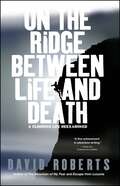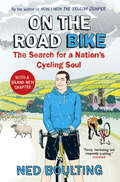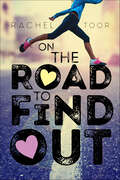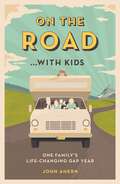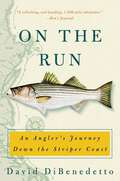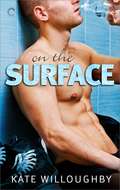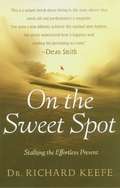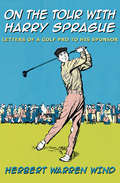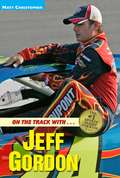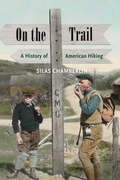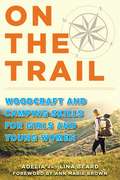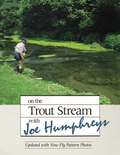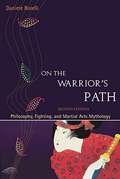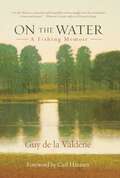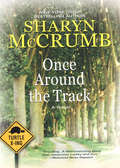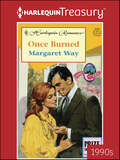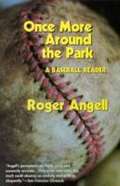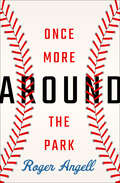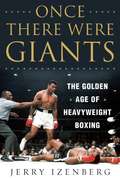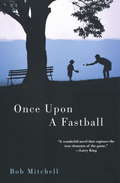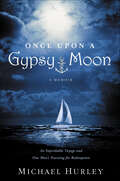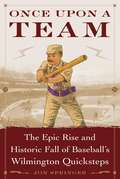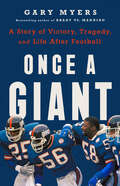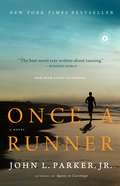- Table View
- List View
On the Ridge Between Life and Death: A Climbing Life Reexamined
by David RobertsBy the time David Roberts turned twenty-two, he had been involved in three fatal mountain climbing accidents and had himself escaped death by the sheerest of luck. Anyone who has ever wondered why mountaineers take the risks that they do will be moved and enlightened by On the Ridge Between Life and Death, as will anyone who appreciates vivid, dramatic storytelling and an unflinchingly honest self-examination of a lifetime spent pursuing a dangerous pastime.
On the Road Bike: The Search For a Nation’s Cycling Soul
by Ned Boulting‘British cyclist. It used to be an oxymoron, a sort of silliness. Like French Cricket’ Ned Boulting has noticed something. It’s to do with bikes. They’re everywhere. And so are their riders. Some of these riders seem to be sporting sideburns and a few of them are winning things. Big things. Now Ned wants to know how on earth it came to this. And what, exactly is 'this'. In On the Road Bike, Ned Boulting asks how Britain became so obsessed with cycling. His journey takes him from the velodrome at Herne Hill to the Tour of Britain at Stoke-on-Trent via Bradley Wiggins, Chris Boardman, David Millar (and David’s mum), Ken Livingstone, both Tommy Godwins, Gary Kemp (yes, him from Spandau Ballet) and many, many more. The result is an amusing and personal exploration of the austere, nutty soul of British cycling.'Funny, fascinating and frequently touching ... will be enjoyed by anyone with even a passing interest in cycling. No bib shorts required' Guardian
On the Road to Find Out
by Rachel ToorOn New Year's Day, Alice Davis goes for a run. Her first ever. It's painful and embarrassing, but so was getting denied by the only college she cares about. Alice knows she has to stop sitting around and complaining to her best friend, Jenni, and her pet rat, Walter, about what a loser she is. But what she doesn't know is that by taking those first steps out the door, she is setting off down a road filled with new challenges—including vicious side stitches, chafing in unmentionable places, and race-paced first love—and strengthening herself to endure when the going suddenly gets tougher than she ever imagined, in On the Road to Find Out by Rachel Toor.
On the Road... with Kids: One Family's Life-Changing Gap Year
by John AhernCraving a great adventure, John Ahern buys a battered campervan online, aiming to spend a year travelling on the road… with kids. Taking their children through 30 countries on a hilarious and life-changing journey, John and wife Mandy find themselves mugged by monkeys, charmed by snake handlers and inspired by their fellow wanderers.
On the Run: An Angler's Journey Down the Striper Coast
by David DiBenedetto“[A] lively account of a fall spent chasing the striped-bass migration from Maine to the Outer Banks” (Sports Illustrated).Each autumn, one of nature’s most magnificent dramas plays out when striped bass undertake a journey, from the northeastern United States to the Outer Banks of North Carolina, in search of food and warmer seas. Writer and angler David DiBenedetto followed this great migration—the fall run—for three months in the autumn of 2001.On the Run offers vivid portrayals of the zany and obsessive characters DiBenedetto met on his travels—including the country’s most daring fisherman, an underwater videographer who chucked his corporate job in favor of filming striped bass, and the reclusive angler who claims that catching the world-record striper in 1982 sent his life into a tailspin. Along his route, DiBenedetto also delves into the natural history and biology of this great game fish, and depicts the colorful cultures of the seaside communities where the striped bass reigns supreme.
On the Surface
by Kate WilloughbyBook one of In the ZoneNHL player Tim Hollander lost his temper one time and threw a water bottle at an abusive fan. After "Bottlegate," he's traded to the San Diego Barracudas, where he'll need to keep the bad publicity to a minimum while proving he can still compete with the younger guys on the ice.Erin Collier is a pediatric nurse who's never seen a hockey game, but gets in line for Tim's autograph at a PR event in hopes of impressing the doctor she has a crush on. When an obnoxious fan gets pushy toward Erin, Tim rushes to defend the pretty stranger, throwing a punch in the process.Grateful for the rescue, Erin agrees to stand by Tim during the resulting press conference and host him at a hospital charity event. Their chemistry is palpable, and soon their lives are intertwined. But Erin doubts a hockey player is capable of anything resembling a real relationship. And if Tim can't get her to see beyond what's on the surface, they'll never last longer than a single season...95,000 words
On the Sweet Spot
by Richard KeefeLike most moments of spiritual revelation, this one took place on a landfill in New Jersey. A young man is standing at an unprepossessing driving range, hitting balls toward a distant fence, when something unusual takes place. As he begins his swing, he has the sensation that his club is drawing itself back on its own; when it is ready, it starts downward, makes perfect contact, and the ball soars off in the right-to-left arc he'd imagined, hitting the exact fencepost he'd been aiming at from 250 yards away. He steps back and wonders if he can do it again. He feels like an observer as the swing begins itself and resolves itself after perfect contact with the waiting ball, which again smacks against the distant post. He has, for however brief a time, entered "the zone. "Everyone who plays a sport knows that fleeting, ineffable sensation of everything falling into place: The pitched baseball looks as big as a grapefruit, the basket looks as wide as a trash can, the players around you are moving in slow motion. But as Richard Keefe, the director of the sport psychology program at Duke University, looked deeper into the nature of his experience, he found profound links to the spirit, the brain, perhaps even the soul. Keefe recognized that the feeling golfers and other athletes have of "being in the zone" is basically the same as a meditative state. And as a researcher with experience in brain chemistry, he went one step further: If we can figure out what's happening in the brain at such times, he reasons, we can learn how to get into that "zone" instead of just waiting for it to happen. This is the Holy Grail of sport psychology -- teaching the mind to get out of the way so the body can do the things it's capable of doing. Keefe calls it the "effortless present," when the body is acting of its own accord while the brain has little to do but watch. All religions describe some kind of heightened awareness in their disciplines; Keefe explores whether such mystical experience is a fundamental aspect of our evolution, an integral part of what makes us human and keeps us from despair. And he brings the discussion back to the applications of such knowledge, reflecting on our ability to use these alternate planes to achieve better relationships, better lives, better moments. Keefe's true subject is extraordinary experience -- being in the zone, in the realm of effortless action. On the Sweet Spotbuilds from the physical and neurological to the mystical and philosophical, then adds a crucial layer of the practical (how we can capture or recapture these wondrous states). It is a work in the proud tradition ofThe Sweet Spot in Time, Flow: The Psychology of Optimal Experience, and How the Mind Works.
On the Tour with Harry Sprague: Letters of a Golf Pro to His Sponsor
by Herbert Warren WindAmerica&’s greatest golf writer cracks wise in this humorous peek inside the life and mind of an up-and-coming young proIf Hogan had to wait 15 years before winning the Open I guess even a natural athalete like me has to wait a couple of years huh? Harry Sprague may not be the most eloquent golfer on the winter circuit, but spelling and grammar are the least of his concerns. First, he has to work on his putting, which, due to the aradic nature of the greens at Pebble Beach, Cypress Point, the Arizona Country Club, and other Sun Belt courses, is keeping him out of the money. And speaking of money, Harry suspects that his current sponsorship deal—he runs a driving range from April to November for no salary in exchange for the cash to go on tour—might not be the fairest of deals. Finally, there are the fans. In California, Arizona, Texas, Louisiana, Georgia, and Florida, beautiful women line the fairways hoping for a date with their favorite pro. But as Harry soon learns, if wedding bells don&’t ring the following winter, he&’ll have hell to pay. First published in Sports Illustrated, these humorous missives from the bottom rungs of the leader board will delight duffers and low handicappers alike.
On the Track with…Jeff Gordon
by Matthew F ChristopherMatt Christopher delves into the life of Jeff Gordon, the racing sensation, and recreates his memorable moments with exciting turn-by-turn action. This fast-paced biography includes photos, Gordon's stats, and a list of his NASCAR career highlights.
On the Trail: A History of American Hiking
by Silas ChamberlinThe first history of the American hiking community and its contributions to the nation&’s vast network of trails. In the mid-nineteenth century urban walking clubs emerged in the United States. A little more than a century later, tens of millions of Americans were hiking on trails blazed in every region of the country. This groundbreaking book is the first full account of the unique history of the American hiking community and its rich, nationwide culture. Delving into unexplored archives, including those of the Appalachian Mountain Club, Sierra Club, Green Mountain Club, and many others, Silas Chamberlin recounts the activities of hikers who over many decades formed clubs, built trails, and advocated for environmental protection. He also discusses the shifting attitudes of the late 1960s and early 1970s when ideas about traditional volunteerism shifted and new hikers came to see trail blazing and maintenance as government responsibilities. Chamberlin explores the implications for hiking groups, future club leaders, and the millions of others who find happiness, inspiration, and better health on America&’s trails. &“With rich historical context Silas Chamberlin inspires new appreciation for trailblazers, while sharing the legacy of hiking and its growing importance today, as people find their way to a new relationship with the natural world.&”—Richard Louv, author of Last Child in the Woods and Vitamin N &“Chamberlin has demonstrated that what at first looks simple—walking on our own two feet—has a complex history of changing cultural associations, social infrastructure, and national significance.&”—James Longhurst, University of Wisconsin – La Crosse
On the Trail: Woodcraft and Camping Skills for Girls and Young Women
by Ann Marie Brown Lina Beard Adelia BeardA classic hiking and camping manual for young women
On the Trout Stream with Joe Humphreys
by Joe HumphreysThis unique adventure in book publishing takes you through a series of detailed, exciting lessons from one of the great fly fishermen of all time, Joe Humphreys. In extraordinary photo sequences, detailed captions, and imaginative, original schematic drawings illustrating theory as well as practical technique, Joe shows you how to catch trout.Joe talks directly to you, the reader, in On the Trout Stream, as if you were wading along beside him for a one-on-one lesson. You are in the current at his side as he points out ways to read water, shows you what tippet-fly combo he&’s going to use for a particular stream situation, discusses casting, makes his approach, and, with you at his side, lands fish.Joe goes into the basics of bottom-drifting the nymph. He talks conditioning—the context of the weather&’s seasonal rhythms and how trout react, as well as how their behavior is affected by a dozen other factors, from light to temperature to the nature of the food chain. He shows you his favorite flies, some of them never-before-photographed originals, with advice on tying and fishing. He shows you ways to figure out what the trout are taking and how, in a myriad of different stream situations. You wade along with Joe as he plies intermixing currents, pocket water, riffles, pools, runs, feeder streams, spring holes, guts, shallows, and tight brush with his nymphs and dry flies, showing you—and talking to you—step-by-step through his system of fishing: a body of knowledge developed in over 100,000 hours of hands-on trouting experience on some of the world&’s toughest water.How do you get that weighted nymph bouncing naturally over the bottom where it&’s going to catch fish? What is the single most important factor in casting the dry fly? How should you build your leader for different types of water, current, and stream-configuration? When should you ignore water temperature? What&’s the one nymph-approach trout can&’t seem to resist? What&’s the secret of the hook-up?On the Trout Stream gives you hard information and instruction in an original, highly visual presentation of how Joe Humphreys actually fishes. Unprecedented in approach, full of new tips as well as photo-sequence explanations of techniques never before fully explained anywhere, this reading—and looking—experience will prove indispensable to anyone who has already grasped the basics of fly fishing and is surely destined to take its place among the innovative teaching texts in any sport.
On the Warrior’s Path: Philosophy, Fighting, and Martial Arts Mythology
by Daniele BolelliThe urge to forge one's character by fighting, in daily life as well as on the mat, appeals to something deep within us. More than a collection of fighting techniques, martial arts constitute a path to developing body, spirit, and awareness. On the Warrior's Path connects the martial arts with this larger perspective, merging subtle philosophies with no-holds-barred competition, Nietzsche with Bruce Lee, radical Taoism and Buddhism with the Star Wars Trilogy, traditional martial arts with basketball and American Indian culture. At the center of all these phenomena is the warrior. Though this archetype seems to manifest contradictory values, author Daniele Bolelli describes the heart of this tension: how the training of martial technique leads to a renunciation of violence, and how overcoming fear leads to a unique freedom. Aimed at students at any level or tradition of martial arts but also accessible to the armchair warrior, On the Warrior's Path brings fresh insights to why martial arts remains an enduring and widespread art and discipline. Two new chapters in this second edition focus on spirituality in the martial arts and the author's personal journey in the field.
On the Water: A Fishing Memoir
by Guy de la ValdèneFrom the acclaimed author of Fragrance of Grass comes a meditation on water and nature, fishing and growing older. On the Water is a gorgeously written collection of essays that all take place on or near the water and pay tribute to the flora and fauna associated with those ecosystems. There are essays about the finer points of tickling rainbow trout in the streams of Normandy, and of eagles and ospreys fishing for bass while barely breaking the surface of the water. There are stories of droughts and floods, of dogs and boats, of worms and rattlesnakes and even of catching and cooking soft-shell turtles that taste like osso-bucco. There is fishing and diving in the Bahamas, tarpon fishing in the Florida Keys, and fly fishing for sailfish in Central America. And there are larger-than-life personalities that are bigger than the fish tales they tell! On the Water is a finely honed and well crafted collection of tales for the true sportsman and makes for a perfect companion volume to la Valdene&’s celebrated collection of essays on hunting.
Once Around the Track
by Sharyn MccrumbMcCrumb draws you close, makes you care. --Los Angeles Times Racing fans have never seen anything like it--and they've seen plenty--the first all-women's team in stock-car racing history. Already a national sensation, the spotlight heats up when financial challenges force Team 86 to hire a male "wheel man. " And Badger Jenkins is a man all right--a sweet-faced Georgian who oozes aw-shucks charm off the track and unleashes blistering speed in competition. But the real Badger is a hard man to know. Just ask the women whose job it is to keep both car and driver in one piece. From crew chief and team manager Tuggle to engine specialist Rosalind Manning, publicist Melanie Sark and diehard fan Taran Stiles, this asphalt sisterhood will power through a racing season of dizzying highs and terrifying lows to prove that women can do a man's job. And when the unthinkable happens, each will realize that they've been hurtling at breakneck speed toward a moment that will change them forever. Rave Reviews For Sharyn McCrumb "McCrumb writes with a quiet fire. . . like every true storyteller, she has the Sight. " --The New York Times Book Review "There is no one quite like her among present-day writers. No one better, either. " --The San Diego Union-Tribune "McCrumb portrays people so well it makes your heart ache. " --Atlanta Journal-Constitution
Once Burned (Family Ties)
by Margaret Way"She Wears His Ring..."Guy Harcourt is strong, forceful and dynamic. He is also irresistible to women.Celine Langton is one of those women."When I left Guy three years ago it was because I felt he deserved someone more sophisticated. Someone like my cousin Ashley. But now my grandmother needs me, so I've come home to stay. Ashley's still making a play for Guy, but he seems determined to rekindle our romance. I know it will make grandmother happy to see us back together, but I can't imagine what the consequences will be if Guy finds out that I still love him and that I still wear his ring...."
Once More Around the Park: A Baseball Reader
by Roger AngellThe most celebrated baseball writer of our time has selected his favorite pieces from the last forty years in this definitive volume of his most memorable work. As a chronicler of the game, he's in a class with Ring Lardner and Red Smith. --Newsweek
Once More Around the Park: A Baseball Reader
by Roger AngellThis essay collection covers more than forty years of history, fandom, and insider analysis from &“the best baseball writer of our time—maybe ever&” (Newsweek) The celebrated baseball chronicler has selected his favorite pieces from the last forty years to create Once More Around the Park, a definitive volume of his most memorable work. Here are the extraordinary games Roger Angell has witnessed and written about, as well as compelling insights that deepen our love and understanding of the sport. This book includes such timeless essays as &“The Interior Stadium,&” on the complex attractions of baseball; &“In the Country,&” on a friendship that began with a fan letter and took Angell far from the big stadiums and big money; &“The Arms Talks,&” on contemporary pitching strategy and the arrival of the split-finger delivery; and many others. Angell&’s conversations with past and present players and managers, scouts and coaches, rookies and Hall of Famers enhance his expertise and critical appreciation, defining him as &“baseball&’s most eloquent analyst&” (The New York Times Book Review).
Once There Were Giants: The Golden Age of Heavyweight Boxing
by Jerry IzenbergA celebration and memorial of the greatest era of heavyweight fighters from 1962 to 1997, as witnessed ringside by an International Boxing Hall of Fame sportswriter. Once upon a time, of all the memories made in ballparks and arenas from California to New York, there was nothing to rival that magic moment that could grab a heavyweight fight crowd by its collective jugular vein and trigger a tsunami of raw emotion before a single punch had even been thrown. That’s the way it was when the heavyweight giants danced in the boxing ring during the golden eras of the greats Ali, Frazier, Holmes, and Spinks, to name a few. There will never again be a heavyweight cycle like the one that began when Sonny Liston stopped Floyd Patterson and ended when Mike Tyson bit a slice out of Evander Holyfield’s ear; when no ersatz drama, smoke, mirrors, and noise followed a fighter’s entry into the ring; when the crowds knew that these men were not actors on a stage but rather giants in a ring with a single purpose?to fight other giants. By the ringside, acclaimed sportswriter Jerry Izenberg watched history as it was being made during those legendary days, witnessing fights like the Thrilla in Manila and the Rumble in the Jungle and preserving them in punchy yet tremendous prose. Delivering both his eyewitness accounts and revelatory back stories of this greatest era of heavyweight boxing, Izenberg invites readers to a place of recollection.Once There Were Giants is his memorial to this extraordinary time, the likes of which we shall never see again.
Once Upon a Fastball
by Bob MitchellYour legacy is in the Attic. The words leap from the cryptic poem left for Harvard professor Seth Stein by his Papa Sol, the doting grandfather who vanished without a trace two years earlier. It was Papa Sol who instilled an unquenchable passion for baseball in Seth's soul; it was Sol who also ignited Seth's obsession with history, spinning fabulous tales of times and people long gone. Seth is still searching for answers to Papa Sol's disappearance when the poem leads him to a scuffed, yellowed baseball resting in a box handmade by his grandfather. A single touch of the rough leather thrusts Seth through the swirling vortex of history onto the streets of 1950s Brooklyn, and then to the greatest baseball game ever played, the Bobby Thomson "Shot Heard 'Round the World" play-off classic. In this surreal, sepia-toned site of past glory, Seth begins a wondrous, life-changing odyssey to find the answers he so desperately seeks. Suspenseful, thought-provoking, funny, and poignant, this beautifully crafted novel is a joyous tribute to our inspiring and timeless national pastime, and a rare treasure for all those who love baseball. "Back . . . back . . . back . . . back. Yes, this novel is a home run." --Chris Berman "Bob Mitchell writes like a crafty veteran with a lot of pitches . . . he mixes baseball, history, and family to show us how sports connects. Enjoy." --Dan Shaughnessy "An endearing tale of love and loyalty . . . this delightful romp is a love letter to a time gone by." --T. Jefferson Parker "Once Upon a Fastball celebrates things Mitchell and I both love: history, poetry, baseball, family traditions, and noble values. No wonder I liked it immensely." --Fay Vincent
Once Upon a Gypsy Moon: An Improbable Voyage and One Man's Yearning for Redemption
by Michael HurleyMichael Hurley watched his world unravel in the wake of infidelity, divorce and failure. In August 2009, he was short of money, out of a job, and seeking to salvage a life that had foundered. Deeply in need of perspective, he took to the open seas in a 32-foot sailboat, Gypsy Moon. The story of his 2-year outward odyssey, deterred by rough weather and mechanical troubles, combines keen observation, poignant thoughts, and deeper introspection with glorious prose. Once Upon a Gypsy Moon also presents a rare and much-needed point of view on the familiar spiritual-journey narrative. It offers a star-crossed love story wrapped inside a rollicking good sea tale, but it also has something important to say to the reader about relationships, faith and disbelief, life and death, love and marriage, and what really matters.
Once Upon a Team: The Epic Rise and Historic Fall of Baseball's Wilmington Quicksteps
by Jon SpringerIn 1884, professional baseball was still in its infancy. The National League was less than a decade old, the National Association (which had been around since 1871) was now defunct, the American Association (which began two years earlier) were nipping at the NL’s heels, and a new league—the Union Association—was in its first year.With all that going on, a hard-playing, hard-drinking club out of tiny Wilmington, Delaware—the Quicksteps—were so dominating their minor-league opponents that they would receive the opportunity of a lifetime.At 51–12, the Quicksteps were easily handling the struggling Eastern League, which was still in its inaugural season. Led by archetypal stars Tommy “Oyster” Burns and Edward “The Only” Nolan, the Quicksteps attacked opponents with a spike-sharpened, rough-and-tumble approach to the game that was only then coming into style, including Nolan’s revolutionary delivery: the curve ball. They clinched the league title with six weeks left in the season, and then did something no other team had ever done before.The UA’s inaugural season wasn’t going as well as they had hoped. Four teams folded before the season’s conclusion, and the red-hot Quicksteps were slated to be promoted to the professional league—something which, then and now, is unheard of—replacing the defunct Philadelphia Keystones.Unfortunately, things did not go as well for Wilmington in the UA as it did in the Eastern League. As the first shots are fired in a near century-long battle for player rights, mass defections, and a comedy of on-field error and misfortune resigned the Quicksteps to a virtually unassailable record for baseball futility. In 18 games, the Quicksteps went 2–16, giving them a .111 winning percentage (compared to their .810 winning percentage in the Eastern League). The UA would fold at seasons’ end—as would the Quicksteps.Loaded with colorful characters, highlight plays, and behind-the-scenes drama, Jon Springer (Mets by the Numbers) tells the forgotten true story of a tumultuous and remarkable summer; a team driven and summarily destroyed by its own dream of success.
Once a Bum, Always a Dodger: My Life in Baseball from Brooklyn to Los Angeles
by Don Drysdale Bob VerdiThe Los Angeles Dodgers were one of the dominant teams of the late 1950s and the 1960s,winning four pennants and three World Championships. Baseball in the West was a homecoming for Drysdale, and he started with Sandy Koufax as the most dominant pair of pitchers in the National League....<P> When the young rookie righthander first walked into the clubhouse, there they were, the Boys of Summer--Jackie Robinson, Pee Wee Reese, Duke Snider, Roy Campanella--his heroes, the pride of Brooklyn. Now Hall of Famer Don Drysdale recounts his pitching career with one of the most popular teams in baseball, from Brooklyn to Los Angeles, the victories and the heartbreaks.
Once a Giant: A Story of Victory, Tragedy, and Life After Football
by Gary MyersThe inside story of the Super Bowl champion 1986 Giants, the extraordinary friendships that resulted--and stunning revelations about the hardships they faced, based on new interviews with Bill Parcells, Phil Simms, Mark Bavaro, and Bill Belichick. The 1986 New York Giants are legendary. A championship team coached by Bill Parcells and his wunderkind assistant Bill Belichick, featuring future Hall of Famers and All-Pros like Phil Simms, Lawrence Taylor, Mark Bavaro, and Harry Carson. They were dominant on the field and formed a unique and lasting bond off of it. More than thirty years later, it's the friendships that have proved more important--a matter of life and death. In Once a Giant, bestselling football writer Gary Myers tells the story of that team and what became of it. Gridiron glory eventually faded; chronic pain, addiction, and in some cases crimes have followed. Many football players face these harsh realities, but the Giants have confronted and survived them together. With unprecedented access, Myers dives into such issues as Mark Bavaro's battle with injuries, the breakup and reconciliation of Parcells and Belichick, and Lawrence Taylor's struggles with sobriety. He creates a never-before-seen portrait of the team's run to the title, and their even more challenging fight to live after it ended.
Once a Runner: A Novel
by John L. Parker Jr.The undisputed classic of running novels and one of the most beloved sports books ever published, Once a Runner tells the story of an athlete&’s dreams amid the turmoil of the 60s and the Vietnam war.Inspired by the author&’s experience as a collegiate champion, the novel follows Quenton Cassidy, a competitive runner at fictional Southeastern University whose lifelong dream is to run a four-minute mile. He is less than a second away when the turmoil of the Vietnam War era intrudes into the staid recesses of his school&’s athletic department. After he becomes involved in an athletes&’ protest, Cassidy is suspended from his track team. Under the tutelage of his friend and mentor, Bruce Denton, a graduate student and former Olympic gold medalist, Cassidy gives up his scholarship, his girlfriend, and possibly his future to withdraw to a monastic retreat in the countryside and begin training for the race of his life against the greatest miler in history. A rare insider&’s account of the incredibly intense lives of elite distance runners, Once a Runner is an inspiring, funny, and spot-on tale of one individual&’s quest to become a champion.
